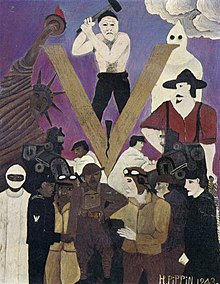
| Part of a series on |
| Discrimination |
|---|
 |
Prejudice can be an affective feeling towards a person based on their perceived group membership.[1] The word is often used to refer to a preconceived (usually unfavourable) evaluation or classification of another person based on that person's perceived personal characteristics, such as political affiliation, sex, gender, gender identity, beliefs, values, social class, age, disability, religion, sexuality, race, ethnicity, language, nationality, culture, complexion, beauty, height, body weight, occupation, wealth, education, criminality, sport-team affiliation, music tastes or other perceived characteristics.[2]
The word "prejudice" can also refer to unfounded or pigeonholed beliefs[3][4] and it may apply to "any unreasonable attitude that is unusually resistant to rational influence".[5] Gordon Allport defined prejudice as a "feeling, favorable or unfavorable, toward a person or thing, prior to, or not based on, actual experience".[6] Auestad (2015) defines prejudice as characterized by "symbolic transfer", transfer of a value-laden meaning content onto a socially-formed category and then on to individuals who are taken to belong to that category, resistance to change, and overgeneralization.[7]
The United Nations Institute on Globalization, Culture and Mobility has highlighted research considering prejudice as a global security threat due to its use in scapegoating some populations and inciting others to commit violent acts towards them and how this can endanger individuals, countries, and the international community.[8]
- ^ "Definition of PREJUDICE". www.merriam-webster.com. Retrieved 2021-09-21.
- ^ Bethlehem, Douglas W. (2015-06-19). A Social Psychology of Prejudice. Psychology Press. ISBN 978-1-317-54855-3.
- ^ Turiel, Elliot (2007). "Commentary: The Problems of Prejudice, Discrimination, and Exclusion". International Journal of Behavioral Development. 31 (5): 419–422. doi:10.1177/0165025407083670. S2CID 145744721.
- ^ William James wrote: "A great many people think they are thinking when they are merely rearranging their prejudices." Quotable Quotes – Courtesy of The Freeman Institute.
- ^ Rosnow, Ralph L. (March 1972). "Poultry and Prejudice". Psychologist Today. 5 (10): 53–6.
- ^ Allport, Gordon (1979). The Nature of Prejudice. Perseus Books Publishing. p. 6. ISBN 978-0-201-00179-2.
- ^ Auestad, Lene (2015). Respect, Plurality, and Prejudice (1 ed.). London: Karnac. pp. xxi–xxii. ISBN 9781782201397.
- ^ Bello, Valeria (2014). "Why Prejudice is a Global Security Threat". UNU-GCM: United Nations University Institute on Globalization, Culture and Mobility.